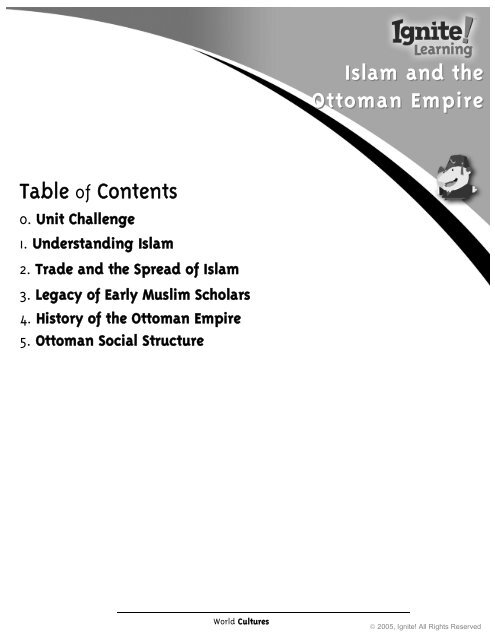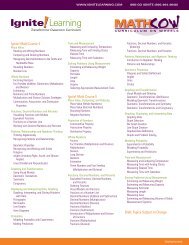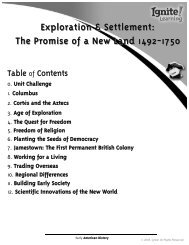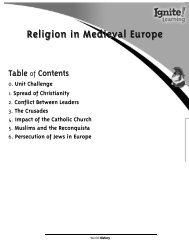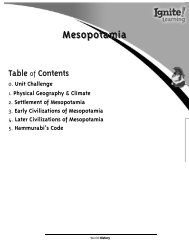Islam and the Ottoman Empire Table of Contents - Ignite! Learning
Islam and the Ottoman Empire Table of Contents - Ignite! Learning
Islam and the Ottoman Empire Table of Contents - Ignite! Learning
You also want an ePaper? Increase the reach of your titles
YUMPU automatically turns print PDFs into web optimized ePapers that Google loves.
<strong>Islam</strong> <strong>and</strong> <strong>the</strong><br />
<strong>Ottoman</strong> <strong>Empire</strong><br />
<strong>Table</strong> <strong>of</strong> <strong>Contents</strong><br />
0. Unit Challenge<br />
1. Underst<strong>and</strong>ing <strong>Islam</strong><br />
2. Trade <strong>and</strong> <strong>the</strong> Spread <strong>of</strong> <strong>Islam</strong><br />
3. Legacy <strong>of</strong> Early Muslim Scholars<br />
4. History <strong>of</strong> <strong>the</strong> <strong>Ottoman</strong> <strong>Empire</strong><br />
5. <strong>Ottoman</strong> Social Structure<br />
World Cultures<br />
ã 2005, <strong>Ignite</strong>! All Rights Reserved
UNIT CHALLENGE<br />
Purpose: The unit challenges help students explore <strong>the</strong> big picture <strong>the</strong>mes that tie toge<strong>the</strong>r each unit <strong>of</strong><br />
<strong>Ignite</strong>! content. These challenges are designed to complement <strong>the</strong> <strong>Ignite</strong>! Topic Lessons.<br />
Each challenge presents students with an openended task with no single correct solution. Working in<br />
small groups, students prepare a short response, in ei<strong>the</strong>r written or oral form, in which <strong>the</strong>y use<br />
knowledge gained by studying <strong>the</strong> unit’s multimedia movies to formulate <strong>and</strong> defend a particular position.<br />
These responses can be used to stimulate fur<strong>the</strong>r class discussion <strong>and</strong> exploration <strong>of</strong> <strong>the</strong> issues.<br />
NOTE: In order to use this activity with your class for a particular <strong>Ignite</strong>! unit, you should plan on<br />
having students study <strong>the</strong> <strong>Ignite</strong>! movies from most <strong>of</strong> <strong>the</strong> topics in that unit. O<strong>the</strong>rwise, students<br />
will not have enough information to complete <strong>the</strong> challenge activity.<br />
Class time required:<br />
· 15 minutes at <strong>the</strong> start <strong>of</strong> unit to organize students into groups <strong>and</strong> review <strong>the</strong> challenge, <strong>and</strong> for<br />
<strong>the</strong> groups to discuss <strong>and</strong> record <strong>the</strong>ir initial thoughts <strong>and</strong> current knowledge <strong>of</strong> <strong>the</strong> issues.<br />
· 20 minutes at <strong>the</strong> end <strong>of</strong> <strong>the</strong> unit for student groups to complete <strong>the</strong>ir responses to <strong>the</strong> challenge.<br />
· Optional: 2030 minutes for student groups to present <strong>the</strong>ir responses to <strong>the</strong> class.<br />
Teacher Instructions:<br />
At <strong>the</strong> Start <strong>of</strong> <strong>the</strong> Unit: Before studying any <strong>of</strong> <strong>the</strong> unit’s topics or movies:<br />
1. divide your class into teams <strong>of</strong> 3 to 4 students;<br />
2. reproduce <strong>the</strong> unit challenge worksheet <strong>and</strong> distribute to students;<br />
3. decide whe<strong>the</strong>r teams will give oral presentations <strong>and</strong>/or written statements in response to <strong>the</strong>ir<br />
challenge;<br />
4. read <strong>the</strong> challenge(s) out loud <strong>and</strong> make sure that all terms <strong>and</strong> concepts are understood;<br />
5. ask groups to complete Part One <strong>of</strong> <strong>the</strong>ir worksheets (Getting Started). They should discuss <strong>and</strong><br />
write down <strong>the</strong>ir thoughts, based on <strong>the</strong>ir current knowledge for how <strong>the</strong>y might respond to <strong>the</strong><br />
selected challenge.<br />
While <strong>the</strong> Class Studies <strong>the</strong> Unit’s Topics: Over <strong>the</strong> next few days or weeks, as you are using <strong>the</strong> <strong>Ignite</strong>!<br />
Topic Lessons for this unit, occasionally remind students to record on <strong>the</strong>ir worksheets any information<br />
<strong>the</strong>y have found in <strong>the</strong> <strong>Ignite</strong>! movies that might help <strong>the</strong>m to develop or support <strong>the</strong>ir response to <strong>the</strong><br />
challenge. They should record this information in Part Two <strong>of</strong> <strong>the</strong>ir worksheets (Taking Notes).<br />
After Completing <strong>the</strong> Last Topic <strong>of</strong> <strong>the</strong> Unit: Give your students 20 minutes to discuss <strong>and</strong> write up <strong>the</strong>ir<br />
response to <strong>the</strong> challenge. They can use <strong>the</strong> space provided in Part Three <strong>of</strong> <strong>the</strong>ir worksheets (Preparing<br />
Your Response). You might consider allowing <strong>the</strong>m to review some <strong>of</strong> <strong>the</strong> movies from <strong>the</strong> unit. Then,<br />
have students give brief presentations <strong>of</strong> <strong>the</strong>ir responses (2 to 3 minutes each) <strong>and</strong>/or submit <strong>the</strong>ir written<br />
responses.
Name:<br />
<strong>Islam</strong> <strong>and</strong> <strong>the</strong> <strong>Ottoman</strong> <strong>Empire</strong><br />
World Cultures<br />
<strong>Islam</strong> <strong>and</strong> <strong>the</strong> <strong>Ottoman</strong> <strong>Empire</strong><br />
Unit Challenge<br />
Challenge A: Whaddya Know?<br />
Background: Often, when we learn more about a particular topic, we are surprised to find out that some <strong>of</strong><br />
<strong>the</strong> things we thought were true about that topic are actually not correct. By learning more about a<br />
particular part <strong>of</strong> <strong>the</strong> world, our old assumptions <strong>and</strong> stereotypes are challenged <strong>and</strong> replaced by a<br />
more detailed <strong>and</strong> accurate underst<strong>and</strong>ing.<br />
Challenge: After viewing <strong>the</strong> <strong>Ignite</strong>! Movies on <strong>Islam</strong> <strong>and</strong> <strong>the</strong> <strong>Ottoman</strong> <strong>Empire</strong>, describe two times when you<br />
saw or heard something that surprised you <strong>and</strong> made you change <strong>the</strong> way you think about <strong>the</strong>se<br />
issues.<br />
Tip: For each example, first describe what you used to think. Then explain what you learned <strong>and</strong> how that<br />
new information made you change your thinking. What surprised you?<br />
Challenge B: You’d Better Believe It!<br />
Background: What you do in life <strong>of</strong>ten depends on what you believe, but what you believe sometimes<br />
changes. As in o<strong>the</strong>r societies, beliefs played an important role in <strong>the</strong> early history <strong>of</strong> <strong>Islam</strong>. The<br />
people's religion <strong>and</strong> philosophies <strong>of</strong>ten shaped <strong>the</strong>ir government, economy, arts, <strong>and</strong> society as a<br />
whole.<br />
Challenge: Describe two ways in which religion or philosophy influenced society.<br />
Tips:<br />
· Some <strong>of</strong> <strong>the</strong> things you might consider are <strong>the</strong> type <strong>of</strong> government <strong>the</strong>y had, <strong>the</strong> rules <strong>and</strong> laws that<br />
people followed, how <strong>and</strong> where <strong>the</strong>y traded goods <strong>and</strong> made money, <strong>and</strong> <strong>the</strong> contact <strong>the</strong>y had with<br />
o<strong>the</strong>r societies. How did <strong>the</strong>ir beliefs affect <strong>the</strong>se things?<br />
· For each example, describe what happened, when, <strong>and</strong> why.<br />
PART ONE – Getting Started<br />
Directions: Choose one <strong>of</strong> <strong>the</strong> challenges above, or your teacher will assign you one. Based on what you<br />
already know, talk with <strong>the</strong> o<strong>the</strong>r members <strong>of</strong> your group about how you might respond to this challenge.<br />
Write your thoughts in <strong>the</strong> box below. You can change your mind later after you have reviewed <strong>the</strong> <strong>Ignite</strong>!<br />
movies in this unit.<br />
Notes:<br />
ã 2005, <strong>Ignite</strong>! All Rights Reserved
Name:<br />
<strong>Islam</strong> <strong>and</strong> <strong>the</strong> <strong>Ottoman</strong> <strong>Empire</strong><br />
World Cultures<br />
Name:<br />
PART TWO – Taking Notes<br />
Directions: As you view <strong>and</strong> discuss <strong>the</strong> <strong>Ignite</strong>! movies in this unit, be on <strong>the</strong> lookout for information that<br />
will help you develop a response to your challenge. Record that information in <strong>the</strong> box below. Use additional<br />
paper if necessary.<br />
Notes:<br />
PART THREE – Preparing Your Response<br />
Directions: Depending on your teacher’s instructions, work with your group to create a written or oral<br />
response to your challenge. Decide on <strong>the</strong> argument you wish to make or <strong>the</strong> position you wish to take, <strong>and</strong><br />
be sure to include evidence from <strong>the</strong> <strong>Ignite</strong>! movies to support your statements. Use <strong>the</strong> space below for<br />
your response. Use additional paper if necessary.<br />
ã 2005, <strong>Ignite</strong>! All Rights Reserved
World Cultures<br />
Lesson Plan<br />
unit<br />
<strong>Islam</strong> <strong>and</strong> <strong>the</strong> <strong>Ottoman</strong> <strong>Empire</strong><br />
# 1. Underst<strong>and</strong>ing <strong>Islam</strong><br />
Class:___________________<br />
Type Instruction: Whole Class<br />
<strong>Learning</strong> Objective(s): Students trace <strong>the</strong> origins <strong>of</strong> <strong>Islam</strong>. Students underst<strong>and</strong> <strong>the</strong> basic beliefs <strong>of</strong> <strong>Islam</strong> <strong>and</strong> <strong>Islam</strong>’s<br />
connection with Judaism <strong>and</strong> Christianity.<br />
Length <strong>of</strong> Time: 10 Minutes<br />
<strong>Ignite</strong>! Movies:<br />
• The Story <strong>of</strong> Muhammad<br />
• Muslims’ View <strong>of</strong> <strong>the</strong> Prophets<br />
• The Teaching <strong>of</strong> <strong>Islam</strong><br />
Teacher Instructions: Play <strong>Ignite</strong>! movies with students <strong>and</strong> complete <strong>the</strong> following activity.<br />
Part One: Students fill in <strong>the</strong> blanks.<br />
Part Two: Students use <strong>the</strong>ir notes to write a paragraph on <strong>Islam</strong>’s connection with Judaism <strong>and</strong> Christianity.<br />
Target Vocabulary/Key Terms:<br />
• Abraham • Muhammad<br />
• Allah • Pilgrimage<br />
• Five Pillars • Prophet<br />
• Hajj • Ramadan<br />
• Koran • Sunnah<br />
• Mecca • Zakat<br />
Notes:<br />
ã 2005, <strong>Ignite</strong>! All Rights Reserved<br />
<strong>Islam</strong> <strong>and</strong> <strong>the</strong> <strong>Ottoman</strong> <strong>Empire</strong><br />
Underst<strong>and</strong>ing <strong>Islam</strong><br />
World Cultures
Name:<br />
<strong>Islam</strong> <strong>and</strong> <strong>the</strong> <strong>Ottoman</strong> <strong>Empire</strong><br />
Underst<strong>and</strong>ing <strong>Islam</strong><br />
World Cultures<br />
Underst<strong>and</strong>ing <strong>Islam</strong><br />
Directions: As you view each media piece, complete <strong>the</strong> chart with notes about <strong>Islam</strong>.<br />
The Story <strong>of</strong> Muhammad<br />
1. <strong>Islam</strong> is based on <strong>the</strong> belief that <strong>the</strong>re is one God called ____________________________.<br />
2. _____________________was born in Mecca <strong>and</strong> believed he received messages from God.<br />
3. The _________________ is a collection <strong>of</strong> <strong>the</strong> messages Muhammad received from Allah.<br />
4. Muslims believe in worshipping __________ God(s).<br />
5. There are now ______________ Muslims. It is <strong>the</strong> world’s ____________ growing religion.<br />
Muslims’ View <strong>of</strong> <strong>the</strong> Prophets<br />
Muslims believe that:<br />
1. The first fa<strong>the</strong>r <strong>of</strong> <strong>Islam</strong> was ____________________________.<br />
2. Christians <strong>and</strong> Jews trace many spiritual traditions back to ________________________.<br />
3. Moses was a _________________ who taught core messages <strong>of</strong> ___________________.<br />
4. The Ten Comm<strong>and</strong>ments have <strong>the</strong> same core teachings as <strong>the</strong> _____________________.<br />
5. Jesus was a __________________ who taught core messages <strong>of</strong> ___________________.<br />
6. Muhammad was a ________________ who taught core messages <strong>of</strong> _______________.<br />
7. God’s message was distorted by <strong>the</strong> _____________ <strong>and</strong> __________________ religions.<br />
The Teachings <strong>of</strong> <strong>Islam</strong><br />
Give one fact for each <strong>of</strong> <strong>the</strong> Five Pillars <strong>of</strong> <strong>Islam</strong>:<br />
1. Faith<br />
2. Prayer<br />
3. Charity<br />
4. Fasting<br />
5. Hajj<br />
ã 2005, <strong>Ignite</strong>! All Rights Reserved
Name:<br />
<strong>Islam</strong> <strong>and</strong> <strong>the</strong> <strong>Ottoman</strong> <strong>Empire</strong><br />
Underst<strong>and</strong>ing <strong>Islam</strong><br />
World Cultures<br />
Underst<strong>and</strong>ing <strong>Islam</strong><br />
Directions: Which <strong>of</strong> <strong>the</strong> following statements best expresses <strong>the</strong> Muslim view <strong>of</strong> <strong>the</strong> prophets. Draw a circle around<br />
“Option A” or “Option B” to show <strong>the</strong> correct answer.<br />
Draw a circle around “Option A” or “Option B” to show <strong>the</strong> correct answer.<br />
Option A:<br />
Option B:<br />
Muslims believe that Moses <strong>and</strong> Jesus<br />
were prophets who taught <strong>the</strong> core<br />
messages <strong>of</strong> <strong>Islam</strong>.<br />
Muslims believe that Abraham <strong>and</strong><br />
Muhammad were <strong>the</strong> only prophets who<br />
taught <strong>the</strong> core beliefs <strong>of</strong> <strong>Islam</strong>.<br />
Draw a circle around “Option A” or “Option B” to show <strong>the</strong> correct answer.<br />
Option A:<br />
Option B:<br />
Muslims who observe <strong>the</strong> Five Pillars <strong>of</strong><br />
<strong>Islam</strong> pray five times a day, make at least<br />
one trip to Mecca, worship <strong>the</strong> god Allah,<br />
practice charity towards <strong>the</strong> needy, <strong>and</strong><br />
fast as a form <strong>of</strong> worship.<br />
Muslims who observe <strong>the</strong> Five Pillars <strong>of</strong><br />
<strong>Islam</strong> pray when <strong>the</strong>y choose to, worship<br />
<strong>the</strong> god Allah, do not have to go without<br />
food as a form <strong>of</strong> worship, practice charity<br />
to <strong>the</strong> needy, <strong>and</strong> may or may not travel to<br />
Mecca.<br />
ã 2005, <strong>Ignite</strong>! All Rights Reserved


